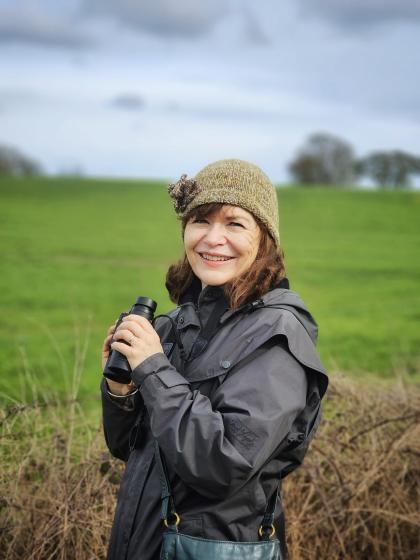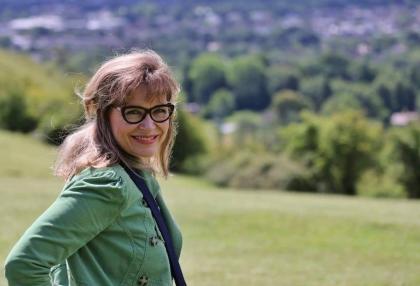
Annie’s story
Before the menopause I’d struggled with fibroids – doctors were monitoring things but that stopped when the menopause started. I already had bloating and a round tummy because of the fibroids. I’d also been to the doctor’s a couple of times with stomach pain in the year or so before the diagnosis, but this was put down to fibromyalgia, a long-term condition that causes pain all over the body, and which I'd had for a few years.
I was referred for an ultrasound, and it took weeks because I hadn’t been referred along the cancer pathway, and was told that it was the fibroids that were causing the symptoms.

Things got worse before they got better. I went to the GP again because I’d begun to have bowel problems and my stomach was so bloated. I told them that I felt something, perhaps a lump, on the right of my abdomen, but they kept concentrating on the left. It got so bad that I decided to pay for my own ultrasound.
The ultrasound technician told me to ask for further tests urgently, as they could see a mass. My GP didn’t react well to any of this – they made me feel I was a nuisance. Because a CA125 blood test hadn’t come back raised, the GP assured me that none of this was sinister. I was referred to a regular gynaecologist.
Insisting on a diagnosis
Then several things happened quickly: I rang up again and spoke to another GP, who looked at my scans and sent me on a cancer pathway. I spoke to a gynaecology doctor on the phone. And I arranged an MRI myself. Various medical professionals looked at my scans and couldn’t see anything, but I wasn’t giving up. Finally, I was referred to the gynae-oncology team at one of the big regional hospitals. That’s when it began to feel like progress.
Support line
It was incredibly difficult to keep being told nothing was wrong, or that it was fibroids. So I called the support line, and it completely changed my life. I think it kept me going. I’ve been in touch with Val a lot in particular, and she’s pulled me out of a hole so many times. She made everything clear: from the actual diagnosis to the surgery I would need, to following up to check I was doing well afterwards. She always told me the truth. When I first called her I truly thought I might not get through this diagnosis – and she made me see that I could. I couldn’t have asked for a better support through some very dark days.

Ask for help
I finally got surgery, followed by a diagnosis of stage IA mucinous ovarian cancer. This is a rare type of ovarian cancer, which might explain why it took longer to diagnose. The weeks and months that it took to get diagnosed and finally understand what was wrong with me took their toll. My other health issues, including the fibromyalgia, made things more complex again. So I got some help from psychiatric services to get me through the surgery and aftercare. They really listened to my wishes, and I would tell anyone else who’s struggling with this to reach out and ask for help.
On a mission
Now – I'm on a mission to raise awareness of ovarian cancer. I’m working with my Clinical Commissioning Group (CCG), which is the governing body for all of my local primary care and GP services, to improve ovarian cancer diagnosis in my area. I genuinely thought it was middle age, menopause, and fibroids. Nothing rang alarm bells, and I don’t want that to happen to other women.
An update from Annie - May 2024
I recently passed my four year anniversary of having surgery for ovarian cancer. I continue to see my surgeon every six months, with an annual scan, and they're pleased with my progress. Each year I feel a little bit more like my old self. Recovery in its full sense: emotionally and physically takes a long time, but I'm making good progress.
My surgeon has told me that I have a less than 4% chance of a recurrence and this has helped keep me focussed on continuing to follow a physiotherapy programme and keep myself as healthy as I can.
Now, I focus on doing things I love such as swift conservation and the arts, and spending quality time with my husband Barry and little cat Doodle. Looking after myself well has never been so important and Target Ovarian Cancer's specialist nurse support line continues to help me do that.
If you’ve been affected by this story and would like to speak to a specialist nurse, you can call our dedicated support line on 020 7923 5475 or contact us: [email protected]. We're open from 9am until 5pm, Monday to Friday.
EIN Presswire does not exercise editorial control over third-party content provided, uploaded, published, or distributed by users of EIN Presswire. We are a distributor, not a publisher, of 3rd party content. Such content may contain the views, opinions, statements, offers, and other material of the respective users, suppliers, participants, or authors.

